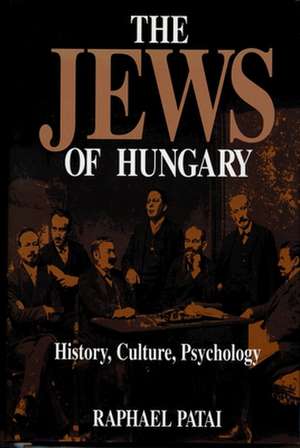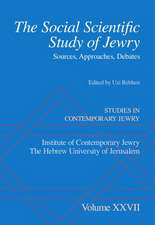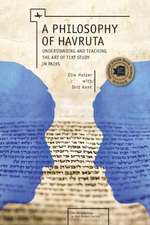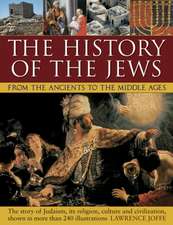The Jews of Hungary: History, Culture, Psychology
Autor Raphael Pataien Limba Engleză Hardback – 30 apr 1996
Preț: 518.14 lei
Nou
Puncte Express: 777
Preț estimativ în valută:
99.15€ • 103.78$ • 82.52£
99.15€ • 103.78$ • 82.52£
Carte tipărită la comandă
Livrare economică 31 martie-14 aprilie
Preluare comenzi: 021 569.72.76
Specificații
ISBN-13: 9780814325612
ISBN-10: 0814325610
Pagini: 736
Dimensiuni: 155 x 231 x 46 mm
Greutate: 1.13 kg
Ediția:New.
Editura: Wayne State University Press
ISBN-10: 0814325610
Pagini: 736
Dimensiuni: 155 x 231 x 46 mm
Greutate: 1.13 kg
Ediția:New.
Editura: Wayne State University Press
Notă biografică
Raphael Patai (1911-1996) was a prominent cultural anthropologist, historian, and biblical scholar of international reputation. He was the author of more than three dozen books on Jewish and Arab culture, history, politics, psychology, and folklore.
Textul de pe ultima copertă
The Jews of Hungary is the first comprehensive history in any language of the unique Jewish community that has lived in the Carpathian Basin for eighteen centuries, from Roman times to the present. Noted historian and anthropologist Raphael Patai, himself a native of Hungary, tells in this pioneering study the fascinating story of the struggles, achievements, and setbacks that marked the flow of history for the Hungarian Jews. He traces their seminal role in Hungarian politics, finance, industry, science, medicine, arts, and literature, and their surprisingly rich contributions to Jewish scholarship and religious leadership both inside Hungary and in the Western world. Patai's main focus within the overall history of the Hungarian Jews is their culture and their psychology. Convinced that what is most characteristic of a people is the culture which endows its existence with specific coloration, he devotes special attention to the manifestations of Hungarian Jewish talent in the various cultural fields, most significantly literature, the arts, and scholarship.
















